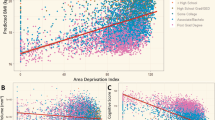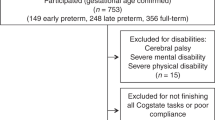Abstract
Objectives:
Poor executive functioning is associated with life-long difficulty. Identification of children at risk for executive dysfunction is important for early intervention to improve neurodevelopmental outcomes.
Study design:
This study is designed to examine relationships between birthweight and executive functioning in US children during kindergarten. Our hypothesis was that children with higher birthweights would have better executive function scores. We evaluated data from 17506 US children from the Early Childhood Longitudinal Study—Kindergarten 2011 cohort. Birthweight and gestational age were obtained by parental survey. Executive functions were directly assessed using the number reverse test and card sort test to measure working memory and cognitive flexibility, respectively. Teacher evaluations were used for additional executive functions. Data were analyzed using SAS to run all linear and logistical regressions.
Results:
For every kilogram of birthweight, scores of working memory increased by 1.47 (P<0.001) and cognitive flexibility increased by 0.28 (P<0.001) independent of gender, gestational age, parental education, and family income. Low birthweight infants were 1.5 times more likely to score in the bottom 20% of children on direct assessment OR=1.49 (CI 1.21−1.85) and OR=1.55 (CI 1.26−1.91).
Conclusions:
Infants born low birthweight are at increased risk of poor executive functioning. As birthweight increases executive function scores improve, even among infants born normal weight. Further evaluation of this population including interventions and progression through school is needed.
This is a preview of subscription content, access via your institution
Access options
Subscribe to this journal
Receive 12 print issues and online access
$259.00 per year
only $21.58 per issue
Buy this article
- Purchase on Springer Link
- Instant access to full article PDF
Prices may be subject to local taxes which are calculated during checkout



Similar content being viewed by others
References
Rodrigues MCCd, Mello RR, Fonseca SC . Learning difficulties in schoolchildren born with very low birth weight. J Pediatria 2006; 82 (1): 6–14.
Bhutta AT, Cleves MA, Casey PH, Cradock MM, Anand KJS . Cognitive and behavioral outcomes of school-aged children who were born preterm - a meta-analysis. J Am Med Assoc 2002; 288 (6): 728–737.
Aylward GP . Neurodevelopmental outcomes of infants born prematurely. J Dev Behav Pediatr 2014; 35 (6): 394–407.
Peg Dawson RG . Smart but Scattered: The Revolutionary "Executive Skills" Approach to Helping Kids Reach Their Potential. Guilford Publishers, New York, 2009.
Richland LE, Burchinal MR . Early executive function predicts reasoning development. Psychol Sci 2013; 24 (1): 87–92.
Hack M, Flannery DJ, Schluchter M, Cartar L, Borawski E, Klein N . Outcomes in young adulthood for very-low-birth-weight infants. J Med 2002; 346 (3): 149–157.
Hack M, Youngstrom EA, Cartar L, Schluchter M, Taylor HG, Flannery D et al. Behavioral outcomes and evidence of psychopathology among very low birth weight infants at age 20 years. Pediatrics 2004; 114 (4): 932–940.
Aarnoudse-Moens CS, Weisglas-Kuperus N, van Goudoever JB, Oosterlaan J . Meta-analysis of neurobehavioral outcomes in very preterm and/or very low birth weight children. Pediatrics 2009; 124 (2): 717–728.
Anderson PJ, Doyle LW Group VICS. Executive functioning in school-aged children who were born very preterm or with extremely low birth weight in the 1990s. Pediatrics 2004; 114: 50–57.
Anderson PJ, De Luca CR, Hutchinson E, Spencer-Smith MM, Roberts G, Doyle LW et al. Attention problems in a representative sample of extremely preterm/extremely low birth weight children. Dev Neuropsychol 2011; 36 (1): 57–73.
Zelazo P . The Dimensional Change Card Sort (DCCS): a method of assessing executive function in children. Nat Protocols 2006; 1 (1): 297–301.
Mulligan G, Hastedt S, Carroll Mc First-Time Kindergartners in 2010–11: First Findings From the Kindergarten Rounds of the Early Childhood Longitudinal Study, Kindergarten Class of 2010–11 (ECLS-K:2011). US Department of Education, National Center for Education Statistics: Washington, DC: 2012.
Hamilton B, Martin J, Osterman M, Curtin S, Mathews TJ . Births: final data for 2014. National Vital Statistics Reports 2015; 64: 1–64.
Wardlaw T, Blanc A, Zupan J, Åhman E. Low Birth Weight Country, Regional, and Global Estimates. World Health Organization: Geneva, 2004.
Wade M, Browne DT, Madigan S, Plamondon A, Jenkins JM . Normal birth weight variation and children's neuropsychological functioning: links between language, executive functioning, and theory of mind. J Int Neuropsychol Soc 2014; 20 (9): 909–919.
Phua DY, Rifkin-Graboi A, Saw SM, Meaney MJ, Qiu A . Executive functions of six-year-old boys with normal birth weight and gestational age. PLoS ONE 2012; 7 (4): e36502.
Black MH, Sacks DA, Xiang AH, Lawrence JM . The relative contribution of prepregnancy overweight and obesity, gestational weight gain, and IADPSG-defined gestational diabetes mellitus to fetal overgrowth. Diab Care 2013; 36 (1): 56–62.
Casey BM, Lucas MJ, McIntire DD, Leveno KJ . Pregnancy outcomes in women with gestational diabetes compared with the general obstetric population. Obstetr Gynecol 1997; 90 (6): 869–873.
Yang J, Cummings EA, O'Connell C, Jangaard K . Fetal and neonatal outcomes of diabetic pregnancies. Obstetr Gynecol 2006; 108 (3 Pt 1): 644–650.
Böhm B, Smedler AC, Forssberg H . Impulse control, working memory and other executive functions in preterm children when starting school. Acta Paediatr 2004; 93 (10): 1363–1371.
Baron IS, Kerns KA, Müller U, Ahronovich MD, Litman FR . Executive functions in extremely low birth weight and late-preterm preschoolers: effects on working memory and response inhibition. Child Neuropsychol 2012; 18 (6): 586–599.
Burnett AC, Scratch SE, Lee KJ, Cheong J, Searle K, Hutchinson E et al. Executive function in adolescents born <1000g or <28 weeks: a prospective cohort study. Pediatrics 2015; 135 (4): e826–e834.
Johnson S, Evans TA, Draper ES, Field DJ, Manktelow BN, Marlow N et al. Neurodevelopmental outcomes following late and moderate prematurity: a population-based cohort study. Arch Dis Child Fetal Neonatal Ed 2015; 100 (4): F301–F308.
Nosarti C, Giouroukou E, Micali N, Rifkin L, Morris RG, Murray RM . Impaired executive functioning in young adults born very preterm. J Int Neuropsychol Soc 2007; 13 (4): 571–581.
Ganella EP, Burnett A, Cheong J, Thompson D, Roberts G, Wood S et al. Abnormalities in orbitofrontal cortex gyrification and mental health outcomes in adolescents born extremely preterm and/or at an extremely low birth weight. Hum Brain Mapp 2015; 36 (3): 1138–1150.
Huppi PS, Warfield S, Kikinis R, Barnes PD, Zientara GP, Jolesz FA et al. Quantitative magnetic resonance imaging of brain development in premature and mature newborns. Ann Neurol 1998; 43 (2): 224–235.
Thompson DK, Wood SJ, Doyle LW, Warfield SK, Lodygensky GA, Anderson PJ et al. Neonate hippocampal volumes: prematurity, perinatal predictors, and 2-year outcome. Ann Neurol 2008; 63 (5): 642–651.
Parikh NA, Lasky RE, Kennedy KA, McDavid G, Tyson JE . Perinatal factors and regional brain volume abnormalities at term in a cohort of extremely low birth weight infants. PLoS ONE 2013; 8 (5): e62804.
Pozzetti T, Ometto A, Gangi S, Picciolini O, Presezzi G, Gardon L et al. Emerging executive skills in very preterm children at 2 years corrected age: a composite assessment. Child Neuropsychol 2014; 20 (2): 145–161.
Subedi D, DeBoer M, Scharf R . Developmental Trajectories in Children with Prolonged NICU Stays. Archives of Disease in Childhood 2017; 102: 29–34.
Breeman LD, Jaekel J, Baumann N, Bartmann P, Wolke D . Attention problems in very preterm children from childhood to adulthood: the Bavarian Longitudinal Study. J Child Psychol Psychiatry Allied Disciplines 2016; 57 (2): 132–140.
Verkerk G, Jeukens-Visser M, Houtzager B, Av W-L, Koldewijn K, Nollet F et al. Attention in 3-year-old children with VLBW and relationships with early school outcomes. Phys Occup Ther Pediatrics 2016; 36 (1): 59–72.
Wolfe KR, Vannatta K, Nelin MA, Yeates KO . Executive functions, social information processing, and social adjustment in young children born with very low birth weight. Child Neuropsychol 2015; 21 (1): 41–54.
Buschkuehl M, Hernandez-Garcia L, Jaeggi SM, Bernard JA, Jonides J . Neural effects of short-term training on working memory. Cogn Affect Behav Neurosci 2014; 14 (1): 147–160.
Grunewaldt KH, Løhaugen GC, Austeng D, Brubakk AM, Skranes J . Working memory training improves cognitive function in VLBW preschoolers. Pediatrics 2013; 131 (3): e747–e754.
Grunewaldt KH, Skranes J, Brubakk AM, Lähaugen GC . Computerized working memory training has positive long-term effect in very low birthweight preschool children. Dev Med Child Neurol 2016; 58 (2): 195–201.
Weicker J, Villringer A, Thone-Otto A . Can impaired working memory functioning be improved by training? A meta-analysis with a special focus on brain injured patients. Neuropsychology 2016; 30 (2): 190–212.
Guare R, Dawson P . Executive Skills in Children and Adolescents: A Practical Guide to Assessment and Intervention. Guilford Press: New York, NY, 2010.
McCloskey G, Perkins L, Divner B Assessment and Intervention for Executive Function Difficulties. Routledge Taylor & Francis Group, LLC New York, 2009.
Shah P, Kaciroti N, Richards B, Oh W, Lumeng JC . Developmental outcomes of late preterm infants from infancy to kindergarten. Pediatrics 2016; 138.
Scharf RJ, Stroustrup A, Conaway MR, DeBoer MD . Growth and development in children born very low birthweight. Arch Dis Child Fetal Neonatal Ed 2016; 101: F433–F438.
Acknowledgements
This work was supported by Doris Duke Charitable Foundation, Clinical Scientist Development Award (RJS).
Author contributions
SEM participated in the design and analysis of the research and was responsible for the first draft of the manuscript. MDDB participated in the design and analysis of the research and the write-up. RJS participated in the design and analysis of the research and the write-up. All authors approved of the final manuscript as submitted and agree to be accountable for all aspects of the work.
Author information
Authors and Affiliations
Corresponding author
Ethics declarations
Competing interests
The authors declare no conflict of interest.
Rights and permissions
About this article
Cite this article
Miller, S., DeBoer, M. & Scharf, R. Executive functioning in low birth weight children entering kindergarten. J Perinatol 38, 98–103 (2018). https://doi.org/10.1038/jp.2017.147
Received:
Revised:
Accepted:
Published:
Issue Date:
DOI: https://doi.org/10.1038/jp.2017.147
This article is cited by
-
Trajectories of Overprotective Parenting and Hyperactivity-Impulsivity and Inattention Among Moderate-Late Preterm Children: A Population-Based Study
Journal of Abnormal Child Psychology (2020)



